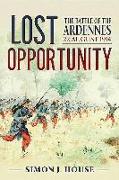- Start
- Lost Opportunity
Lost Opportunity
Angebote / Angebote:
On 22 August 1914 - on a battlefield 100 kilometres wide stretching from Luxembourg to the River Meuse - two French and two German armies clashed in a series of encounters known collectively as the Battle of the Ardennes. On that day, 27, 000 young French soldiers died - the bloodiest day in the military history of France (most of them in the Ardennes) - and yet it is almost unknown to English-speaking readers. There has never been an operational study of the Battle of the Ardennes in any language: at best, a single chapter in a history of greater scope, at least a monograph of an individual tactical encounter within the overall battle. This book fills a glaring gap in the study of the opening phase of the First World War - the Battles of the Frontiers - and provides fresh insight into both French and German plans for the prosecution of what was supposed to be a short war. At the centre of this book lies a mystery: in a key encounter battle, one French Army corps led by a future Minister of War - General Pierre Roques - outnumbered its immediate opposition by nearly six to one and yet dismally failed to capitalise on that superiority. The question is how, and why. Intriguingly, there is a six-hour gap in the war diaries of all General Roques¿ units, it smacks of a cover-up. By a thorough investigation of German sources, and through the discovery of three vital messages buried in the French archives, it is now possible to piece together what happened during those missing hours and show how Roques threw away an opportunity to break the German line and advance unopposed deep into the hinterland beyond. The chimera of a clean break and exploitation that was to haunt the Allied High Command for the next four years in the trenches of the Western Front, was a brief and tantalising opportunity for General Roques. The final part of this book seeks to answer the question 'why?' The history of both French and German pre-war preparation reveals the political, economic and cultural differences that shaped the two opposing national armies. Those differences, in turn, predicated the behaviour of General Roques and his men, as well as that of his German opponent. With a clear understanding of those differences, the reader may now understand how the French lost their best opportunity not only to stymie the Schlieffen Plan, but to change the course of the rest of the war. The author's text is supported by a separate mapbook containing c 50 newly-commissioned colour maps.
Folgt in ca. 15 Arbeitstagen
